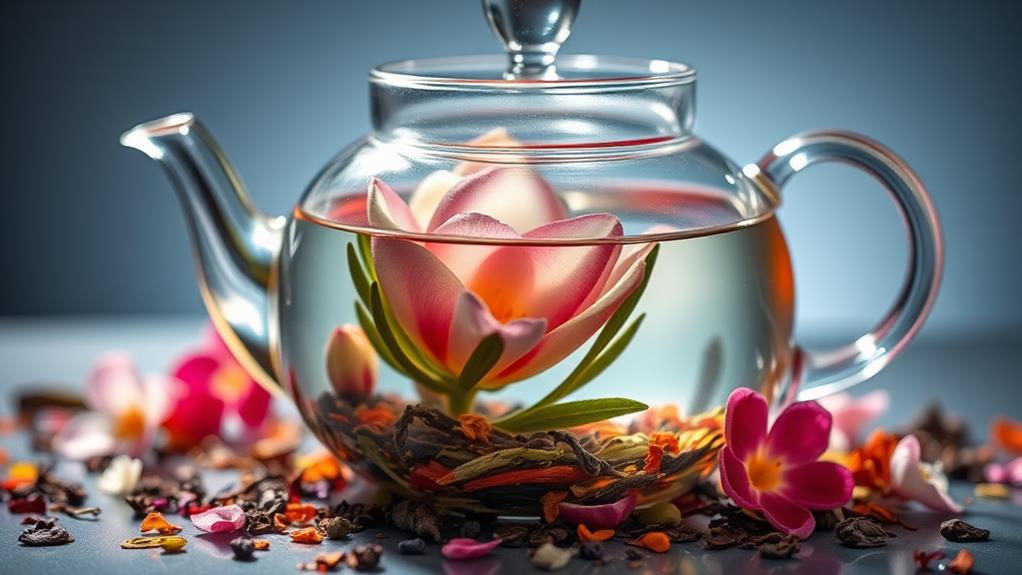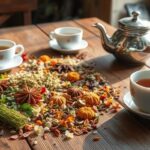Blooming teas are unique beverages that combine art and flavor, enchanting your senses. Originating in China, skilled artisans handcraft these tea balls using green or white tea and vibrant flowers. When steeped, the tea unfurls like a beautiful blossom, making for a stunning presentation. There are various types, like Jasmine Dragon Pearl and Hibiscus, each offering different tastes and aromas. To brew the perfect cup, you'll want to use fresh, clean water at just the right temperature. Plus, these teas are packed with health benefits, adding to their appeal. Stick around, and you'll uncover more fascinating details!
History of Blooming Teas
Have you ever wondered where blooming teas originated? These delightful creations come from China, where tea culture runs deep. The origins trace back to the early 20th century when skilled artisans began crafting these floral wonders.
They took high-quality tea leaves and carefully hand-sewed them with dried flowers like jasmine and lily. This innovative method was designed not just to please the palate but also to create a visual spectacle.
As the tea steeps, the leaves unfurl, revealing a beautiful flower that blossoms right before your eyes. Isn't that enchanting? This art form gained popularity in Chinese tea houses and eventually made its way to the West, enchanting tea lovers everywhere.
Blooming teas aren't just about taste; they're a sensory experience that combines sight, smell, and flavor. Imagine hosting a gathering and impressing your friends with a pot of blooming tea.
It's a conversation starter and a way to showcase your unique taste. So, the next time you sip on a cup of blooming tea, remember its rich history and the artisans who brought this delightful innovation to life.
You're not just enjoying tea; you're partaking in a tradition that celebrates creativity and craftsmanship.
Craftsmanship of Blooming Teas
The artistry behind blooming teas is truly remarkable, showcasing the skill and dedication of the artisans who craft them. When you first encounter a blooming tea, you might be captivated by its unique appearance. Each tea ball is meticulously hand-tied with delicate flowers, often including jasmine, lily, or hibiscus.
These artisans spend years perfecting their techniques, ensuring that each piece isn't only visually stunning but also of the highest quality.
As you steep a blooming tea, the magic unfolds before your eyes. The tightly bound leaves unfurl gracefully, transforming into a beautiful floral display. This process isn't just about aesthetics; it's an innovative fusion of flavor and presentation.
You're not just drinking tea; you're participating in a sensory experience that engages sight, smell, and taste.
The craftsmanship involved requires immense patience and creativity. Each artisan brings their own flair to the process, allowing for an endless variety of designs.
Types of Blooming Teas
Among the diverse varieties of blooming teas, each type offers a unique combination of flavors and visual appeal. You'll discover that these delightful teas often feature a base of green or white tea, intertwined with vibrant flowers like jasmine, lily, or hibiscus. Each bloom is crafted to unfurl gracefully when steeped, creating a mesmerizing display in your teapot.
For instance, the Jasmine Dragon Pearl is a fragrant option, known for its delicate jasmine notes that beautifully complement the green tea base. If you're looking for a fruity twist, try a blooming tea made with hibiscus, which adds a tart and invigorating flavor.
Another standout is the Lily Bloom, where the subtle sweetness of the lily flower combines with the smoothness of white tea, resulting in a soothing brew.
While the visual experience is enchanting, the taste is where the magic truly happens. Each type brings its own character, inviting you to explore and experiment.
Brewing the Perfect Cup
Brewing the perfect cup of blooming tea starts with selecting quality ingredients, because good tea makes all the difference.
Fresh, clean water is essential for the best flavor; using fresh, filtered water can enhance your tea experience greatly.
You'll also want to pay attention to the ideal water temperature—too hot or too cold can ruin your experience.
Selecting Quality Ingredients
When it comes to brewing the perfect cup of blooming tea, selecting quality ingredients is crucial. The beauty of blooming tea lies not just in its appearance, but also in its taste and aroma. You want to make certain you're using the best so that every sip is a delightful experience.
For instance, using high-quality loose leaf tea can greatly enhance the flavor and health benefits of your brew. Here are four key ingredients to focus on:
- High-Quality Tea Leaves: Look for whole leaf teas that are fresh and vibrant. They should be fragrant and free from dust or broken bits.
- Natural Flowers: Verify the flowers used in your blooming tea are organic and free from pesticides. They should be aromatic and visually appealing.
- Authentic Flavors: If you're adding flavors, go for natural extracts or dried fruits, avoiding artificial additives that can mask the tea's true essence.
- Freshness: Always check the packaging date. Fresher ingredients mean a more aromatic and flavorful cup.
Ideal Water Temperature
Getting the water temperature just right is essential for brewing the perfect cup of blooming tea. You might be surprised to learn that the ideal temperature usually falls between 190°F and 200°F (about 88°C to 93°C). This range helps to extract the delicate flavors from the tea leaves without scorching them, as different teas require specific temperature ranges for maximum flavor understanding temperature variations.
If the water's too hot, you risk losing those subtle notes, while cooler water may leave your tea tasting flat.
To achieve this sweet spot, you can use a thermometer, but if you don't have one, there's a handy trick: bring your water to a boil, then let it sit for about 30 seconds. This will cool it down just enough for blooming tea perfection.
When you pour the hot water over your blooming tea, you'll witness a beautiful transformation as the tea blooms, releasing its colors and aromas. This moment isn't just about flavor; it's an art form!
Steeping Time Importance
While many factors contribute to the perfect cup of blooming tea, steeping time plays an important role in revealing the full range of flavors and aromas. You might think of steeping as a dance between the tea and water, where timing is everything.
If you let it steep too long, you risk bitterness; too short, and you miss out on the nuances. Proper steeping time is vital, especially since different types of tea have unique benefits, such as natural sources of antioxidants that enhance overall health.
Here are four reasons why steeping time matters:
- Flavor Development: A precise steeping time allows the tea to release its vibrant flavors fully, making each sip a delightful experience.
- Aroma Unfolding: As the leaves unfurl, the aroma explodes, creating an inviting scent that enhances your tea-drinking ritual.
- Visual Transformation: Watching the blooming process unfold is mesmerizing and adds to the overall enjoyment of your tea.
- Health Benefits: Correct steeping time guarantees you extract beneficial compounds, making your cup not just tasty but also nourishing.
Health Benefits of Blooming Teas
Blooming teas, with their visually stunning presentation, offer more than just aesthetic appeal; they come packed with numerous health benefits. When you sip these delightful brews, you're not just enjoying a beautiful display; you're also nourishing your body.
Many blooming teas are made from high-quality green tea, which is rich in antioxidants and polyphenols that reduce the risks of chronic diseases, promoting overall wellness. These powerful compounds help fight free radicals, promoting overall wellness. Drinking blooming tea can boost your metabolism, making it easier for you to maintain a healthy weight.
Plus, the calming aroma can reduce stress, providing a moment of tranquility in your busy day. You'll find that sipping this tea can improve digestion, thanks to its soothing properties, as tea enhances gut health.
Additionally, some blooming teas include herbs and flowers known for their medicinal qualities. For instance, jasmine can enhance mood, while chrysanthemum may support eye health.
Serving and Pairing Suggestions
When you're ready to enjoy your blooming tea, think about what food pairs best with it.
Light snacks like cucumber sandwiches or fresh fruit can really enhance the flavors, while the right brewing temperature makes all the difference in taste.
Let's explore how to serve your blooming tea for the ultimate experience!
Ideal Food Pairings
Pairing blooming teas with the right foods enhances the experience of both. The unique flavors and aromas of these teas can elevate your meals, making each sip and bite a delightful journey.
Here are some ideal food pairings that will inspire your taste buds:
- Lightly Spiced Asian Dishes: Think of fragrant stir-fries or sushi, where the delicate notes of blooming tea complement the spices without overpowering them.
- Fresh Salads with Citrus Dressings: The bright flavors of lemon or orange can harmonize beautifully with the floral notes, adding a revitalizing twist.
- Soft Cheeses: Creamy brie or goat cheese paired with a smooth blooming tea creates a balance that's luxurious and satisfying.
- Fruit Desserts: Desserts like poached pears or fruit tarts allow the tea's floral essence to shine, creating a sweet, memorable experience.
Brewing Temperature Tips
Getting the brewing temperature right is essential for releasing the full potential of blooming teas.
You'll want to aim for a temperature between 185°F and 195°F (85°C to 90°C) to enhance the delicate flavors and aromas. If the water's too hot, it can scorch the leaves and lead to a bitter taste. On the flip side, brewing at too low a temperature means you might miss out on those vibrant flavors.
To achieve the perfect brew, consider using a thermometer. It's a small investment that can make a big difference. If you don't have one, simply bring your water to a boil and let it cool for about 2-3 minutes.
Once you've nailed the temperature, steep your blooming tea for about 4-6 minutes. This time allows the tea to unfurl beautifully while infusing the water with its unique flavors.
As for pairing, blooming teas shine when enjoyed with light snacks like cucumber sandwiches or fruit tarts. The subtlety of the tea complements these flavors, creating a delightful experience.
FAQ
Where Can I Purchase Blooming Teas Online?
You can explore various online retailers specializing in unique tea experiences. Check out artisanal tea shops or larger platforms like Amazon and Etsy, where innovative blends and presentations await your discovery. Happy sipping!
How Long Do Blooming Teas Last When Stored?
"Good things come to those who wait." When stored properly, blooming teas can last up to 18 months. Keep them in a cool, dry place, away from light, to maintain their vibrant flavor and aroma.
Can Blooming Teas Be Reused for Multiple Brews?
Yes, you can reuse blooming teas for multiple brews! Each infusion reveals unique flavors and aromas. Just steep them gently, and enjoy the evolving experience. Don't be surprised by the delightful changes with each brew!
Are There Any Caffeine-Free Blooming Tea Options?
Imagine sipping a sunset; that's how caffeine-free blooming teas feel. You'll find delightful options, like herbal blends with chamomile or hibiscus, perfect for relaxing evenings. They're innovative choices that still offer beauty and flavor without caffeine.
What Is the Best Temperature for Brewing Blooming Teas?
For the best flavor, brew your tea at around 190°F to 200°F. This temperature allows the delicate flavors to unfold beautifully, ensuring you enjoy a vibrant, aromatic experience that excites your palate.
Final Thoughts
In the world of blooming teas, each flower unfolds like a story, revealing vibrant colors and delightful flavors. As you've learned, the history, craftsmanship, and health benefits are just as enchanting as the tea itself. So, next time you brew a cup, think of it as watching a beautiful flower blossom, bringing joy not just to your taste buds but also to your spirit. Embrace the art of blooming teas, and let each sip be a celebration of nature's wonder!



